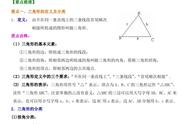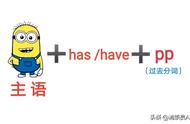在英语中,当主语是第三人称单数时,谓语动词要用第三人称单数形式。第三人称单数形式的规则如下:
- 一般情况:直接加-s**。**
例如:
- He plays basketball.
- She walks to school.
- 以-s、x、z、sh、ch、o结尾:直接加-es**。**
例如:
- The bus passes by.
- The fox chases the rabbit.
- 以-y结尾,且y前面是辅音**:先把y改为i,再加**-es**。**
例如:
- The baby cries.
- The city lies on a river.
- 以-y结尾,且y前面是元音**:直接加**-s**。**
例如:
- The boy plays basketball.
- The day ends.
- 动词be的第三人称单数形式是is**。**
例如:
- The cat is on the table.
- The sun is shining.
- 动词have的第三人称单数形式是has**。**
例如:
- He has a car.
- She has a lot of friends.
- 动词go的第三人称单数形式是goes**。**
例如:
- The man goes to work.
- The woman goes to the store.
- He plays basketball. (他打篮球。)
- She walks to school. (她走路去上学。)
- The bus passes by. (公共汽车开过来了。)
- The fox chases the rabbit. (狐狸追兔子。)
- The baby cries. (婴儿哭了。)
- The city lies on a river. (城市坐落在河边。)
- The cat is on the table. (猫在桌子上。)
- The sun is shining. (太阳在照耀。)
- He has a car. (他有一辆车。)
- She has a lot of friends. (她有很多朋友。)
- The man goes to work. (男人去上班。)
- The woman goes to the store. (女人去商店。)
- 在疑问句中,如果主语是第三人称单数,谓语动词要用does或do。**
例如:
- Does he play basketball? (他打篮球吗?)
- Does she walk to school? (她走路去上学吗?)
- 在否定句中,如果主语是第三人称单数,谓语动词要用does not或do not。**
例如:
- He does not play basketball. (他不打篮球。)
- She does not walk to school. (她不走路去上学。)













